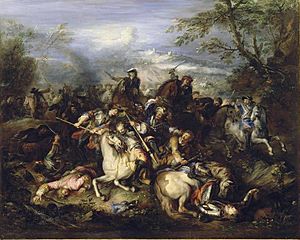Battle of Leuze facts for kids
Quick facts for kids Battle of Leuze |
|||||||
|---|---|---|---|---|---|---|---|
| Part of the Nine Years' War | |||||||
 Combat de Leuze by Joseph Parrocel |
|||||||
|
|||||||
| Belligerents | |||||||
| Commanders and leaders | |||||||
| Strength | |||||||
| 28 squadrons (about 4,000 men) | 72 squadrons (about 12,000 men) | ||||||
| Casualties and losses | |||||||
| 400-700 killed or wounded | 1,500-2,000 killed, wounded or missing | ||||||
The Battle of Leuze was a small but important cavalry battle. It happened on September 18, 1691, near Leuze-en-Hainaut in what is now Belgium. This fight was part of a bigger conflict called the Nine Years' War. In this battle, a smaller French army fought against a much larger group of Allied soldiers. The Allied forces included troops from the Dutch Republic, England, and Scotland.
Contents
What Led to the Battle of Leuze?
The Nine Years' War Background
The Nine Years' War (1688–1697) was a major conflict in Europe. It involved France fighting against a group of countries called the Grand Alliance. This alliance included the Holy Roman Empire, the Dutch Republic, England, and Spain. The war was fought over who would have power and control in Europe.
Armies Prepare for Winter
In 1691, the fighting season was ending. Armies usually stopped fighting in winter because of the cold weather. They would move into special camps called winter quarters. King William III of England, who was also the leader of the Dutch forces, left the army. He went back to England, thinking the fighting for the year was over.
Luxembourg's Surprise Plan
Marshal Luxembourg was a French commander. He found out that King William had left. He also learned that the Allied army, now led by Marshal Waldeck, was getting ready for winter. Luxembourg saw a chance to surprise the Allies.
The Battle Unfolds
French Reconnaissance Mission
Marshal Luxembourg was near a town called Tournai. He sent out a small group of soldiers to scout ahead. This scouting mission is called a reconnaissance. The soldiers were led by a commander named Marsilly. They found out that the main Allied army was moving away. They also saw that a smaller group of Allied cavalry was left behind. This group had about 3,000 men and was led by the Count of Tilly. They were stationed at Leuze.
A Swift French Attack
Luxembourg decided to act quickly. He sent some of his soldiers to follow the main Allied army. Then, he gathered his best cavalry units. These units were led by Villars and Marsilly. With these forces, Luxembourg launched a sudden attack on Count Tilly's smaller group. The French cavalry charged without warning. They used only their swords in the attack.
Allied Reinforcements Arrive
When Field Marshal Nassau-Saarbrücken-Usingen realized the French were attacking, he quickly turned his part of the Allied army around. He tried to help the soldiers who were under attack. However, the Allied reinforcements did not arrive all at once. This meant the French troops could fight them one by one. This made the Allied losses even worse.
French Retreat and Allied Pursuit
Eventually, troops led by Lord Overkirk managed to push back the French cavalry. Meanwhile, Marshal Waldeck rushed his infantry (foot soldiers) towards Leuze. But Luxembourg saw Waldeck approaching. He decided to pull back his French forces before Waldeck's infantry could join the fight. The Allied infantry, including a group called Mackay's Regiment, were present but did not get into much action.
Results of the Battle
The Battle of Leuze was a clear victory for the French. They had fewer soldiers but managed to defeat a much larger Allied force. The French lost between 400 and 700 soldiers. The Allies, however, suffered much heavier losses. They had between 1,500 and 2,000 soldiers killed, wounded, or missing. This battle showed the skill of the French cavalry and Marshal Luxembourg's clever tactics.
See also
In Spanish: Batalla de Leuze para niños
 | Charles R. Drew |
 | Benjamin Banneker |
 | Jane C. Wright |
 | Roger Arliner Young |

